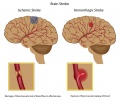Transient Ischemic Attack (TIA)
A transient ischemic attack is most likely caused by a reversible embolism and presents as neurological deficit.[1] TIA can progress to stroke so they act as a warning symptom of something worse to come and the need to identify the root cause. The risk of a TIA increases if there is underlying atherosclerosis or hypertension.[1]
|
Transient Ischemic Attack | |
| Causes | Alcohol, Smoking, Lack of activity |
|---|---|
| See Also | Cardiovascular Conditions, Hypertension, Atherosclerosis, Polycythemia, Diabetes |
| Books | Books on Cardiovascular Conditions |
| Articles | Articles on Cardiovascular Conditions |
Contents
Naturopathic Assessment
Causal Factors
In order to stimulate the innate ability of the body to heal the causes of disease must be identified and addressed. With TIAs the factors are similar to those implicated in atherosclerosis. It is important to rule out other associated conditions such as a seizure, neoplasm, migraine, Meniere’s disease, vertigo, or hyperinsulinemia.[2]
Diagnostic Testing
- A doctor will perform a detailed neurological exam.[3]
- TEE (Transesophageal echocardiography) for cardiac sources of embolism.[4]
- CT or MRI scans.[2]
Related Symptoms and Conditions
TIAs are associated with other conditions such as:
- Previous TIA increases risk for repeat attack.[5]
- Hypertension
- Atherosclerosis
- Diabetes
- Polycythemia
Characteristics
TIA typically displays transient symptoms of stroke. TIA usually lasts about 15 minutes.[2]
The symptoms of a TIA vary, but may include:[6]
- Short term memory loss
- dizziness or vertigo
- headache
- tinnitus or ringing in the ears
- depression
- blurred vision or visual disturbances
- reduced blood flow on ultrasound.
- Transient hemiparesis (muscular weakness on one side) or sensory loss on one side.[7]
Naturopathic Treatment
The goal of naturopathic treatment is to support and work in tandem with the healing power of the body and to address the causal factors of disease with individual treatment strategies. The goal of naturopathic medicine is to prevent a transient ischemic attack. The treatment strategies are similar to those of atherosclerosis and hypertension, the two most common cardiovascular conditions. Only those treatments that are specific to a TIA are included on this page. For more detail check out atherosclerosis and hypertension.
It is always advisable to work with a naturopathic doctor before engaging in any treatment plan.
References
Reviewed by Iva Lloyd, BScH, RPE, ND [1]
- ↑ 1.0 1.1 Smith Fraser, Winterstein James (2008) An Introduction to Principles & Practices of Naturopathic Medicine CCNM Press Inc., Toronto:pg258-260
- ↑ 2.0 2.1 2.2 Berga S, Bowman M, Drossman D, Faling J, Frenkel E, Gabbard G et al. editors.(1992) The Merck Manual of Diagnosis and therapy 16th edition. Rathway: Merck & Co Inc.:pg1452-1465
- ↑ Crocco TJ, Tadros A, Kothari RU (2009) Marx: Rosen’s Emergency Medicine, 7th ed.[internet]. Mosby. Section Seven Neurology Chapter 99 Stroke.[cited 2012 March] Available from: http://co115w.col115.mail.live.com/default.aspx#n=2145351306&st=iva&mid=e0d17dd3-403f-11e1-b486-002264c18e30&fv=1.
- ↑ Gaspar A, Silva I, Costeira Pereira A, Salomé N, António Mariz J, Brandão A, Fernandes F, Simões A, Salgado A, Correia A (2011) Role of transesophageal echocardiography in the assessment and therapeutic management of patients with acute ischemic cerebral events before the age of 65. Rev Port Cardiol;30(7-8):643-8. PMID:22005307
- ↑ Sloma A, Backlund LG, Strender LE, Skånér Y (2010) Knowledge of stroke risk factors among primary care patients with previous stroke or TIA: a questionnaire study. BMC Fam Pract;11:47. PMID:20550690.
- ↑ Murray Michael, Pizzorno Joseph.(1998) Encyclopedia of Natural Medicine. 2nd ed. Three Rivers Press, New York:pg335-340.
- ↑ Mulvihill, Selman, Holdaway, Tompary, Raymond editors.(2006) Human Diseases – A Systemic Approach 6th ed. Pearson Education Inc. pg310-311.
